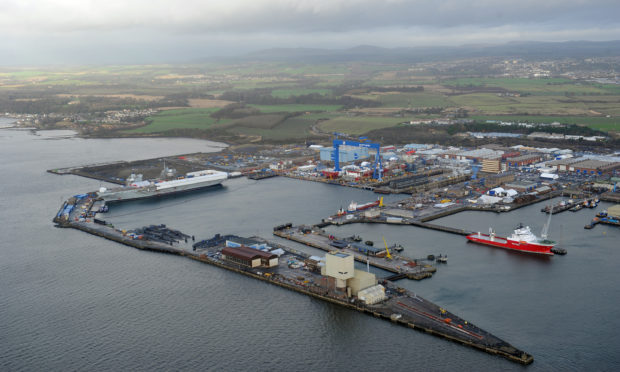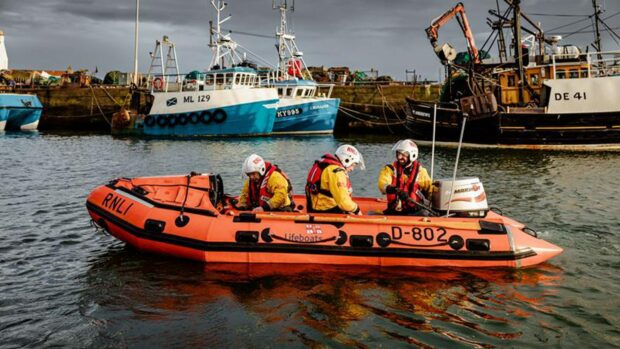Fife has been dealt another jobs blow with the announcement of a further 150 redundancies at Rosyth dockyard.
The end of work on the Royal Navy’s aircraft carrier contract, and a dwindling order book, is being blamed for the new raft of cuts at the yard, which employs around 1,200 workers.
The Unite trade union described the news as a “kick in the teeth for the Scottish economy and a world class workforce that had worked tirelessly to build the UK’s two new aircraft carriers”.
Both Unite and GMB unions have urged the UK government to ensure the Royal Navy’s new auxiliary ships are built in UK shipyards using British steel.
GMB Scotland organiser Gary Cook said: “These redundancies stress the urgent need for the UK Government to ensure the three Royal Fleet Auxiliary vessels are built in British shipyards, including Rosyth.
“The wind down of the aircraft carrier contract creates a vacuum at Rosyth with no significant manufacturing orders on the horizon. Let’s be clear what this means: Peak production at Rosyth sustains over 3,800 jobs and generates over £100 million in wages – that’s what’s on the line.
“Maintenance programmes for warships will sustain some levels of employment in future but it’s a feast and famine existence for yards like Rosyth, which needs large-scale shipbuilding to realise its full potential.
“Against the backdrop of Brexit uncertainty, we need our politicians to stand-up for working class shipbuilding communities like Rosyth and they can do this by demanding the UK government award the RFA contracts to British shipyards.”
Confirming the job losses and the start of a consultation period, Babcock said in a statement: “The prospects for Babcock’s operations at Rosyth remain strong with great opportunities.
“Last year we began the process to reshape our business in order to remain competitive and take on new challenges, as the large-scale design and build phase of the Queen Elizabeth carrier programme reaches completion.
“Today’s workforce announcement is a continuation of the need to right size our organisation.
“Having assessed our current workload and medium term opportunities, we anticipate the loss of around 150 specific roles which are no longer needed in line with the rundown of the programme.
“Our employees remain our priority throughout this process. We understand how unsettling this can be and will work closely with those affected and our trade union representatives through this consultation period to redeploy or relocate as many employees as possible within our wider organisation and support those who may wish to take this opportunity to move on.”
Local MSP Annabelle Ewing has called for “clarity, openness and honesty” from Babcock bosses at the yard when dealing with staff.
The Cowdenbeath SNP MSP said she had been disappointed to be told the news by Babcock Rosyth managing director Sean Donaldson.
“I entirely understand that when a company like Babcock has a massive contract – like HMS Queen Elizabeth – employee numbers will reach a peak and then return to a lower level,” she said.
“But this is not the first announcement of job cuts to have been justified by ‘right-sizing’ at the end of the aircraft carrier project.”
There was a cut of 150 jobs announced almost exactly a year ago and 250 the previous November.
Ms Ewing added: “Workers will want to know when the job cuts as a consequence of the ending of that one contract are going to come to an end.
“Particularly frustrating is the fact that it is less than a month since the Royal Navy awarded Babcock the maintenance contract for HMS Queen Elizabeth and I know that this will be extremely galling for those whose jobs are now under threat.
“My understanding is that Babcock are now entering into a period of consultation with the workforce and hope to manage the process as much as possible through voluntary redundancies and redeployments.
“I would like them to go a step further and give a pledge that there will be no compulsory redundancies.
“The other information that is missing from this announcement is any indication of anticipated timescales.
“Babcock employees deserve clarity, openness and honesty and I hope that this information will be forthcoming.
“What I, and Babcock workers, want to know, is when these job losses are going to stop.”
Unite assistant general secretary for manufacturing Steve Turner said: “The men and women whose skills built the UK’s two new world leading aircraft carriers at Rosyth are at risk of being lost for a generation in a blow to the Scottish economy and UK shipbuilding.
“Today’s announcement of job losses will send shudders down the spine of shipyard workers across the UK who in recent months have endured the threat of redundancy on the Mersey and the closure of Devon’s Appledore shipyard.
“It would be a gross betrayal of a skilled workforce and British manufacturing if the government continued with its obsession to award such work to overseas shipyards and deny manufacturing and communities in the UK the economic benefits that building the royal fleet auxiliary ships would bring.”
Unite regional officer Bob MacGregor added: “Unite will be supporting our members who are affected by this announcement while pressing the company to explore redeployment opportunities to keep job losses to a minimum.
“Unite will also be seeking an urgent meeting with the Scottish government to see what pressure it can bring to bear on the government in Westminster to save jobs by securing guarantees that the royal fleet auxiliary vessels will be built in the UK and the delays to the Type 31e frigate programme lifted.”











